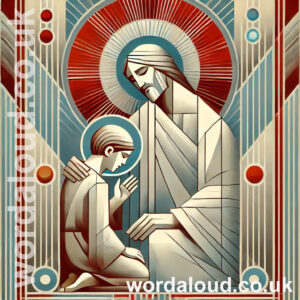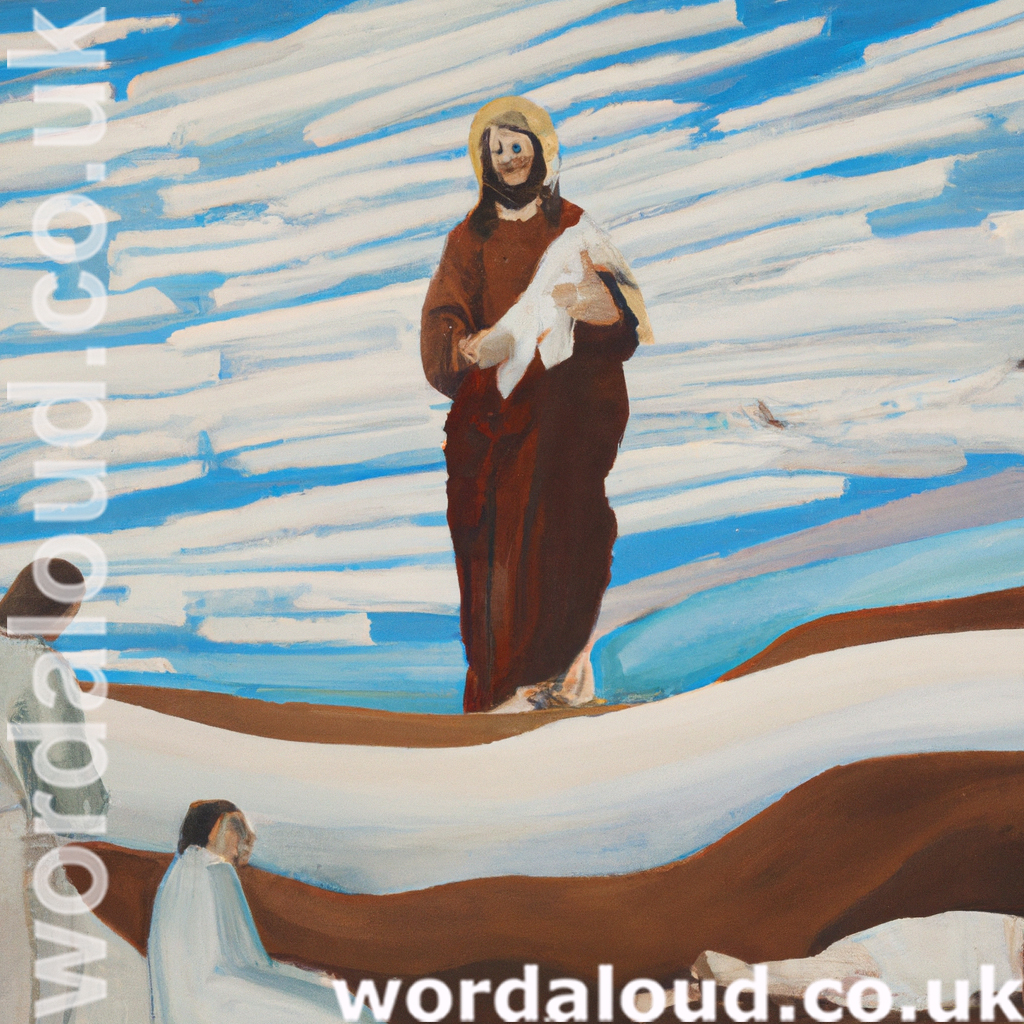Christian Art | Boy At Prayer | Jesus With A Child
Office Of Readings | Wednesday, Lent Week 4 | From The Letters Of Saint Maximus The Confessor
‘God’s mercy towards the penitent.’
Saint Maximus The Confessor (C. 580–662)
Saint Maximus was born around 580 in Constantinople to a distinguished family and initially served as a high-ranking official in the imperial court. However, he left political life to become a monk, devoting himself to asceticism, prayer, and theological study. His writings would later reveal a deep synthesis of biblical exegesis, patristic thought, and Neoplatonic influences.
The Monothelite Controversy | Christ’s Two Wills
At the heart of Maximus’ theological struggle was the Monothelite heresy, which taught that Christ, while having two natures (divine and human), possessed only one will (thelema). This doctrine, promoted by the Byzantine emperors in an attempt to reconcile divisions between Chalcedonian and non-Chalcedonian Christians, was opposed by Maximus, who insisted that Christ had two wills, corresponding to his two natures.
Maximus argued that will follows nature, not person—meaning that since Christ has both a divine nature and a human nature, he must also have both a divine will and a human will. If Christ lacked a human will, then his humanity would be incomplete, and his redemptive work insufficient. The obedience of Christ’s human will to the divine will was, for Maximus, the key to understanding salvation: Christ fully assumed human nature in order to restore it.
Persecution And Confession
Maximus’ resistance to Monothelitism brought him into conflict with imperial authorities. He was arrested, tried, and ultimately exiled. Despite severe torture—including having his tongue cut out and his right hand amputated to prevent him from spreading his teachings—he remained steadfast in his defence of Dyothelitism (the doctrine of the two wills of Christ).
He died in exile in 662, but his theological legacy endured. In 681, nearly two decades after his death, the Third Council of Constantinople formally vindicated his teachings, condemning Monothelitism and affirming that Christ has two wills in perfect harmony.
Legacy
Maximus’ contributions extend beyond Christology; his mystical theology, reflections on divine love, and writings on asceticism deeply influenced both Eastern and Western Christianity. He is venerated as a saint in both the Catholic and Eastern Orthodox Churches, with the title ‘Confessor’ marking his steadfast witness to the truth despite persecution.
Commentary On The Reading For Wednesday Of Lent Week 4
Saint Maximus the Confessor’s reflection on repentance and divine mercy presents a theological meditation on the centrality of salvation in God’s will. The passage expounds upon God’s desire to bring humanity back to God, emphasizing that repentance is the means by which this reconciliation is accomplished. In the context of Lent, this reading calls believers to an earnest return to God through humility, self-examination, and an active commitment to charity and forgiveness.
God’s Desire For Our Salvation
The foundation of Saint Maximus’s reflection is the assertion that nothing pleases God more than the repentance of His people. This aligns with the scriptural theme that God’s will is not for condemnation but for redemption. Throughout salvation history, prophets and teachers have proclaimed this truth, and in the fullness of time, the Incarnation of Christ stands as the ultimate expression of God’s longing to restore humanity to its intended state of communion with Him.
Saint Maximus highlights that the Incarnation, Passion, and Resurrection of Christ are not merely historical events but divine interventions meant to heal the wounded human condition. Jesus took on human nature, bore suffering, and died so that sin might be eradicated, and reconciliation with the Father restored. This is the core of the Christian faith: that salvation is both a divine gift and a human responsibility. God extends His mercy, but individuals must respond through repentance and transformation.
Christ As The Physician And The Shepherd
Saint Maximus invokes several key Gospel passages to illustrate the nature of Christ’s mission. He recalls Jesus’ statement that He came ‘not for the righteous, but for sinners’ and ‘not for the healthy, but for the sick’. These words position Christ as the divine physician who seeks out those in need of healing, emphasizing that spiritual illness—sin—is not an obstacle to God’s mercy but rather the very reason for His salvific work.
The image of Christ as the Good Shepherd further underscores God’s pursuit of the lost. Saint Maximus references the parables of the lost sheep and the lost coin, emphasizing the joy in heaven over the sinner who repents. These parables reveal God’s proactive love: He does not passively wait for sinners to return but actively seeks them out. This affirms that repentance is not an act undertaken in isolation but one that is preceded and supported by divine grace.
The Prodigal Son And Divine Compassion
Another parable that Saint Maximus highlights is that of the Prodigal Son. The father’s response to his son’s return is not one of condemnation or demand for reparation but of immediate, lavish mercy. This underscores a critical point: repentance is not merely about acknowledging sin but about embracing the love and forgiveness God offers. The son’s journey from exile to restoration mirrors the journey of every Christian called to return to God with a contrite heart.
Additionally, Saint Maximus’s reference to this parable serves as an implicit exhortation for believers to imitate divine mercy. Just as the father welcomes his son without reservation, so too are Christians called to practice unconditional forgiveness. Lent, as a season of renewal, provides a special opportunity to reflect on how one can extend mercy to others, particularly through acts of charity and reconciliation.
Burden And Ease Of Repentance
Saint Maximus addresses a common hesitation regarding repentance: its perceived difficulty. He acknowledges that repentance may seem burdensome but points to Christ’s words: ‘Come to me, all you who labour and are heavy laden, and I will give you rest.’ The yoke of Christ, though it requires self-denial and transformation, is ultimately light because it leads to freedom from sin and closer union with God.
This perspective aligns with the broader Christian understanding of repentance not as mere regret but as metanoia—a complete turning toward God. Saint Maximus reminds his audience that divine commands are not oppressive but life-giving. The apparent weight of repentance dissipates when one fully embraces the grace and love that God offers.
Call To Holiness And Imitation Of God
The reading concludes with a call to imitation: ‘Be holy, perfect, and merciful as your heavenly Father is.’ This is a direct challenge to the believer, for it implies that holiness is not reserved for an elite few but is the calling of all. Just as God forgives and welcomes back sinners, so too must Jesus’ followers embody mercy and forgiveness.
Saint Maximus presents this as an integral part of true repentance. The individual who turns back to God must also extend that same love outward. Lent is a time not only for personal transformation but also for communal renewal, where acts of generosity, kindness, and reconciliation manifest the reality of a heart turned toward God.

From The Letters Of Saint Maximus The Confessor
God’s will is to save us, and nothing pleases him more than our coming back to him with true repentance. The heralds of truth and the ministers of divine grace have told us this from the beginning, repeating it in every age. Indeed, God’s desire for our salvation is the primary and pre-eminent sign of his infinite goodness. Precisely in order to show that there is nothing closer to God’s heart than this, the divine Word of God the Father, with untold condescension, lived among us in the flesh, and did, suffered, and said all that was necessary to reconcile us to God the Father, when we were at enmity with him, and to restore us to the life of blessedness from which we had been exiled. He healed our physical infirmities by miracles; he freed us from our sins, many and grievous as they were, by suffering and dying, taking them upon himself as if he were answerable for them, sinless though he was. He also taught us in many different ways that we should wish to imitate him by our own kindness and genuine love for one another.
So it was that Christ proclaimed that he had come to call sinners to repentance, not the righteous, and that it was not the healthy who required a doctor, but the sick. He declared that he had come to look for the sheep that was lost, and that it was to the lost sheep of the house of Israel that he had been sent. Speaking more obscurely in the parable of the silver coin, he tells us that the purpose of his coming was to reclaim the royal image, which had been coated with the filth of sin. ‘You can be sure there is joy in heaven’, he said, over one sinner who repents.
To give the same lesson he revived the man who, having fallen into the hands of the brigands, had been left stripped and half-dead from his wounds; he poured wine and oil on the wounds, bandaged them, placed the man on his own mule and brought him to an inn, where he left sufficient money to have him cared for, and promised to repay any further expense on his return.
Again, he told of how that Father, who is goodness itself, was moved with pity for his profligate son who returned and made amends by repentance; how he embraced him, dressed him once more in the fine garments that befitted his own dignity, and did not reproach him for any of his sins.
So too, when he found wandering in the mountains and hills the one sheep that had strayed from God’s flock of a hundred, he brought it back to the fold, but he did not exhaust it by driving it ahead of him. Instead, he placed it on his own shoulders and so, compassionately, he restored it safely to the flock.
So also he cried out: ‘Come to me, all you that toil and are heavy of heart’. ‘Accept my yoke’, he said, by which he meant his commands, or rather, the whole way of life that he taught us in the Gospel. He then speaks of a burden, but that is only because repentance seems difficult. In fact, however, my yoke is easy, he assures us, and my burden is light.
Then again he instructs us in divine justice and goodness, telling us to be like our heavenly Father, holy, perfect and merciful. Forgive, he says, and you will be forgiven. Behave towards other people as you would wish them to behave towards you.








